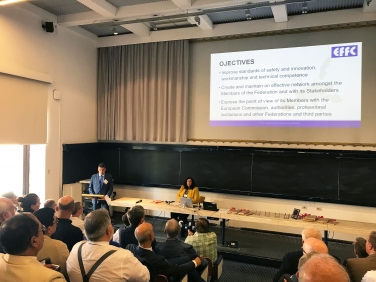
In the first week of June the DFI/EFFC Conference on Urbanisation and Infrastructure Development: Future Challenges was held Rome. It was a highly successful conference with 377 delegates attending an excellent programme. This year we invited the participation of project owners to provide their insight into the challenges and their approach on some of the biggest infrastructure projects in Europe.
Below I have shared the address I gave at the opening of the conference that sets out the EFFC strategy and my perspective on our industry:
“Good morning everybody. Dean of the Sapienza University Antonio D’Andrea, Professor Massimo Grisolia, Guests of Special Sessions, Speakers of Technical Sessions, Moderators, Delegates, Members of DFI and EFFC, ladies and gentlemen, dear Friends; It’s my pleasure to welcome all of you, and to thank you for your attendance at this International Conference on Deep Foundation and Ground Improvement with the theme of Urbanization and Infrastructure Development: Future Challenges.
Let me start my speech with a few slides to show you what the EFFC is and how we work in the Federation.
The EFFC is a Federation of National Federations/Coordinator of 16 European countries: Austria, Belgium, The Czech Republic, Denmark, France, Germany, Hungary, Italy, Netherlands, Poland, Portugal, Romania, Spain, Sweden, Switzerland, United Kingdom.
Its members are Specialist Foundation Contractors which are organised and represented either through National Federations or by a National Coordinator representing that country.
Our more than 400 specialist foundation contractors have an estimated combined turnover of €4.5b.
Our mission statement is to promote the common interest of Members in achieving the highest professional standing of special foundations work across Europe.
Our objectives are:
- Improve standards of safety and innovation, workmanship and technical competence
- Create and maintain an effective network amongst the members of the Federation and with its stakeholders
- Express the point of view of its members to the European Commission, authorities, professional institutions and other Federations and third parties.
MEMBERSHIP:
- Membership is open to companies that specialise in piling work, diaphragm walling and/or other specialist foundation or ground improvement techniques.
- The Federation offers three Membership options: Full Membership, Affiliate Membership and Associate Membership.
WHY ASSOCIATED MEMBERSHIP?
For two reasons:
- Working on standards of workmanship, technical competence and safety & innovation requires the cooperation and opinion of the foundation industry in its entirety.
- The EFFC wants to actively work with our industry partners, so we are inviting: equipment manufacturers, material suppliers, designers and consultants and testing agencies to join the EFFC as Associate Members.
EFFC is managed by an Executive Committee with the assistance of Working Groups.
EFFC WORKING GROUPS
- HEALTH & SAFETY: works to improve levels of health and safety during the execution of geotechnical and foundation works.
- TECHNICAL: reviews European standards and discusses the technical execution of specialist geotechnical work for foundations.
- CONTRACTS: focuses on special conditions of work that are commonly experienced across Europe. The Group is currently working on mutual recognition of rig operator qualifications, collaborative working and BIM.
SUSTAINABILITY:
- We believe sustainable development is development that meets the needs of the present without compromising the ability of future generations to meet their own needs.
- The EFFC has created a Sustainability Charter that sets out what this means for companies operating in the foundations industry.
eCO₂ FOUNDATIONS: The EFFC and DFI have created a tool that calculates CO2 emissions of foundation and geotechnical works, allowing contractors to assess the carbon footprint of their projects.
EFFC / DFI CONCRETE TASK GROUP: Working to address the issues with modern concrete mixes, the Task Group have produced a guide which outlines acceptability criteria for concrete provided for use on site. At this Conference we are going to launch the 2ndedition of this guide.
Moreover, at the moment, we are working together on the application and behaviour of Support Fluids in special foundations.
Following with this line of collaboration with DFI, we have organized this Conference together with them.
On this occasion we thought it would be interesting to include the participation of Owners’ Representatives or Clients to show us the development of 4 Special Projects of infrastructures related to Geotechnical Engineering, that we have named in the Program ‘Megaprojects’. I would like to thank all of them for their attendance at this Conference.
As well as these Special Sessions, the Program also contains: Panel Discussions, Technical Parallel Sessions, Invited Lectures and a Session for Young Engineers and Students.
I would also like to express our gratitude to the speakers and moderators of these sessions and especially to the young engineers or students for their active participation.
New complex projects in the cities, have to be developed in many cases on land and urban areaswhich are not entirely appropriate for the construction of buildings and infrastructures. In these situations, it’s necessary to carry out special foundations works, and to apply special methods of excavation or ground improvement techniques.
In other cases, new buildings or transport infrastructure projects are designed, such as ones for train networks or Metros, which are constructed, in many cases, through the old towns of cities where old buildings with very sensitive structures to the execution of nearby excavations and underground works, are located. It’s precisely in these cases where it’s necessary to perform special foundations or ground improvement techniques.
Finally, we think this is a good chance for the participants at this Conference to exchange experiences and thoughts, and from different points of view: the academic, the consultant and theconstructor.
To conclude, I also want to thank the other sponsors for their support of this event and I hope that our efforts will help you to have a productive and interesting Conference.
In any case, I am certain your presentations and active participation will ensure the success of this event.
Once again, welcome everyone, my gratitude for your attendance, and please enjoy not only the technical sessions but also the social events.
Thank you very much!”
